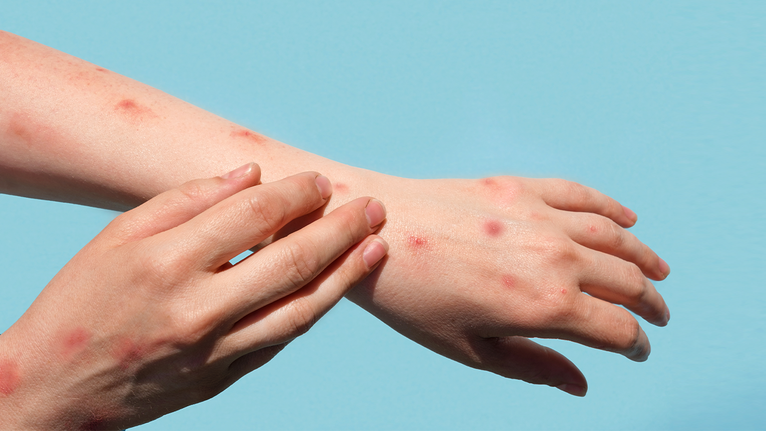Monkeypox is a rare disease that was discovered in 1958, and is caused by infection with the monkeypox virus. The virus is part of the same smallpox virus family and has similar symptoms, but monkeypox is milder. Prior to the recent global outbreak, monkeypox had been reported in people in several central and western African countries.
Monkeypox (Mpox)
Monkeypox is a rare viral infection caused by the monkeypox virus. This contagious disease is spread by human-to-human contact and can cause symptoms similar to those of smallpox.

About This Condition
Understanding Monkeypox: Signs, Symptoms and How to Prevent It
What is monkeypox?

What are the signs and symptoms of monkeypox?
Anyone who has been in close contact with someone who has monkeypox can get the illness. Symptoms include fever, headache, muscle aches and backache, swollen lymph nodes, chills and exhaustion. Another symptom is a rash that can look like pimples or blisters that appear on the face, inside the mouth and on other parts of the body like the hands, feet, chest, genitals or anus.
Before this year’s outbreak, almost all cases in people outside of Africa were linked to international travel to countries where the disease commonly occurs or through imported animals, and these cases occurred on multiple continents. The source of the disease remains unknown—however, African rodents and nonhuman primates, such as monkeys, might harbor the virus and infect people.
Monkeypox can spread from the time symptoms start until the rash has fully healed and a fresh layer of skin has formed. It can also spread from person to person through:
- Direct contact with the infectious rash, scabs or body fluids.
- Respiratory secretions during prolonged, face-to-face contact or during intimate physical or sexual contact.
- Touching items, such as clothing or linens, that previously had contact with the infectious rash or body fluids.
- Pregnant people can spread the virus to their fetus through the placenta.
- It’s also possible for humans to get monkeypox from infected animals, either by being scratched or bitten by the animal, or by preparing or eating meat or using products from an infected animal.
Symptoms for monkeypox are rarely fatal. Over 99% of people who get the disease are likely to survive, however, those with weakened immune systems, children under the age of 8, people with a history of eczema and people who are pregnant or breastfeeding may be more likely to get seriously ill or die.
Monkeypox virus typically lasts two to four weeks. People who do not have symptoms of monkeypox cannot spread the virus to others.
How can I prevent the monkeypox virus?
Here are the things you can do to keep yourself safe from monkeypox:
- Getting the smallpox vaccine can decrease your chances to being infected with the virus.
- Avoid close, skin-to-skin contact with people who have a rash that looks like monkeypox.
- Do not touch the rash or scabs or a person with monkeypox.
- Do not kiss, hug, cuddle or have sex with someone who has monkeypox.
- Do not share eating utensils or cups with a person who has monkeypox.
- Do not handle or touch the bedding, towels or clothing of a person who has monkeypox.
- Wash your hands often with soap and water, or use an alcohol-based hand sanitizer.
Diagnosis and Cure
Currently, monkeypox is diagnosed through Orthopoxvirus testing. There are no treatments available specifically for monkeypox, but antiviral drugs used to treat smallpox may also be used to treat it.
Vaccines for smallpox may also be used to prevent monkeypox because both viruses are genetically similar. If you notice a new or unexplained rash or other monkeypox symptoms, you should consult your healthcare provider.
UC Health’s Infectious Disease Experts
Our infectious disease specialists continue to study the most complex diseases to find the best and newest treatment options. Our partnership with the University of Cincinnati College of Medicine allows our experts to provide more hope for patients who need subspecialty care for their complex conditions through groundbreaking research and clinical trials.
Contact Us
At UC Health, we lead the region in scientific discoveries and embrace a spirit of purpose – offering our patients and their families something beyond everyday healthcare. At UC Health, we offer hope.